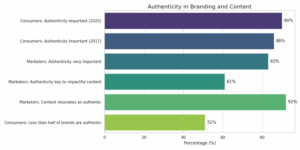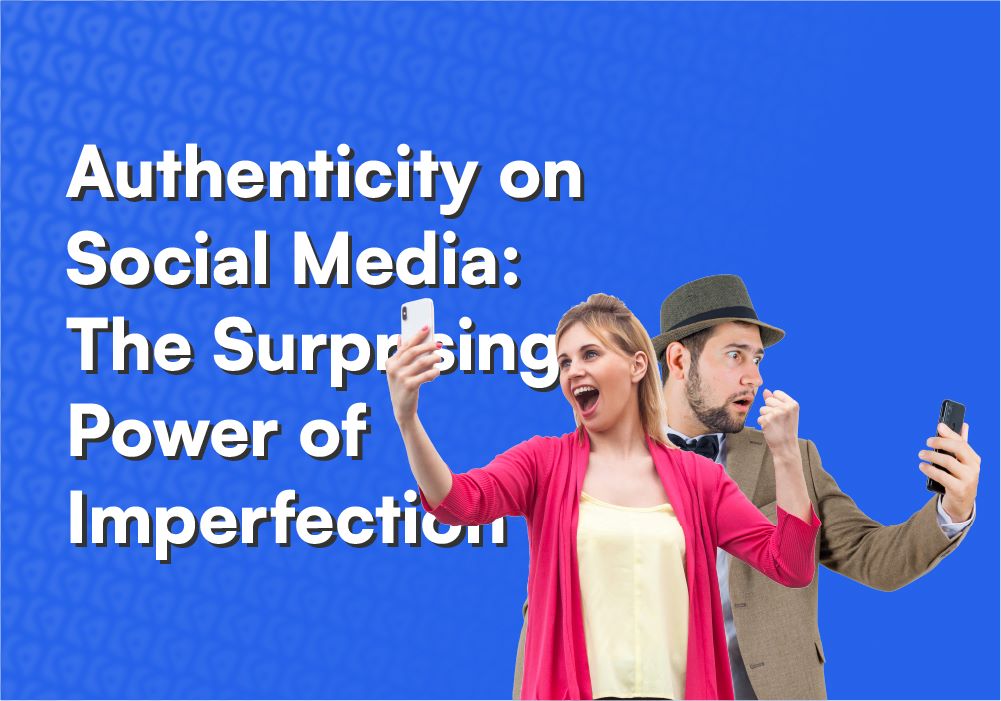Die dunkle Seite der Perfektion in sozialen Medien
Unvollkommene Beiträge können für persönliche Profile funktionieren, aber bei Luxusmarken zählt immer noch die Perfektion. In diesen Fällen überwiegen auf Social Media oft die Ästhetik gegenüber der Authentizität.
Eine Studie von Sites bei Penn State zeigt, dass der Einfluss sozialer Medien auf das Selbstwertgefühl von Persönlichkeit, Interaktionsstil und Plattform abhängt. Aber viele Experten warnen: Perfektion zu jagen—ohne Authentizität in sozialen Medien—kann das mentale Wohlbefinden auf Dauer schädigen.
Was führt zu emotionaler Erschöpfung und „Social Media Fatigue“
Einem perfekten Online-Image hinterherzujagen, kann ganz schön anstrengend sein. Viele Leute fühlen sich ausgelaugt — ein Zustand, der als „Social Media Fatigue“ bekannt ist, geprägt von Stress und Gefühlsabkopplung. Ein großer Grund dafür ist die fehlende Authentizität in den sozialen Medien. Ständiger Vergleich mit idealisierten Posts setzt unter Druck. Ohne echte, nachvollziehbare Inhalte kann emotionales Burnout folgen.
Manche Leute nutzen soziale Medien als Therapie, um Stress abzubauen, besonders wenn man sich mit Inhalten beschäftigt, die sich echt anfühlen und emotional unterstützend sind.
Das wachsende Verlangen nach Echtheit in der digitalen Welt
Laut Forbes legen 90% der Verbraucher großen Wert auf Authentizität, wenn sie Marken auswählen, die sie unterstützen. (Quelle: Forbes)

Das Balkendiagramm zeigt einen Vergleich zwischen der Wahrnehmung von Authentizität im Marketing aus der Sicht von Konsumenten und Markenmanagern (Marketers). Die Daten stammen aus Forbes und wird in Prozent angezeigt.
Fast 90 % der Verbraucher gaben an, dass Authentizität bei der Entscheidung, welche Marken sie mögen und unterstützen, wichtig ist – ein Anstieg von 86 % im Jahr 2017. Marketing-Profis wissen, wie wichtig Authentizität ist: 83 % sagen, dass Authentizität für ihre Marke sehr wichtig ist, und 61 % glauben, dass Authentizität der wichtigste Faktor für wirkungsvolle Inhalte ist. Erstaunliche 92 % der Marketer sind der Meinung, dass die meisten oder alle Inhalte, die sie erstellen, für die Verbraucher authentisch wirken. Doch die Mehrheit der Verbraucher ist anderer Meinung: 51 % sagen, dass weniger als die Hälfte der Marken Inhalte produziert, die sich authentisch anfühlen.
Wie das Streben nach Perfektion die Nutzer zermürbt
Perfekt inszenierte Posts, wie direkt aus einem Hochglanzmagazin, setzen nicht nur Creator, sondern auch Konsumenten unter Druck. Dieses ständige Streben nach ästhetischer Perfektion führt oft zu digitaler Überforderung—oft als “Social Media Burnout” bezeichnet.
Was bedeutet eigentlich „Ästhetisch unvollkommen“?
Soziale Medien-Formate, die sich gut für authentischen Content eignen, umfassen Vlogs, Behind-the-Scenes-Clips, spontane TikTok-Videos, ungefilterte Instagram-Storys und persönliche Erfahrungsberichte. Diese ungescripteten, kaum bearbeiteten Posts fördern emotionale Nähe und wirken besonders vertrauenswürdig.
Zwischen Chaos und Charme: Kleine Fehler als nachvollziehbare Berührungspunkte
Fotos oder Videos mit wackeligen Kameras. Influencer, die über ihre Worte stolpern oder Hintergrundgeräusche, die sich “echt” anfühlen. Solche “Fehler” lassen Inhalte authentischer wirken und weniger distanziert. Anstatt die Professionalität zu untergraben, steigern sie tatsächlich die Echtheit in den sozialen Medien.
In Momenten, in denen die Dinge nicht perfekt laufen oder zu sehr poliert aussehen, entsteht eine besondere Verbindung zum Publikum. Diese spontanen Details machen die Creator zugänglicher und menschlicher—und stärken das Vertrauen ihrer Follower.
Psychologische Gründe für den Erfolg von unperfekten Posts
Nähe und Authentizität in sozialen Medien: Warum Nutzer echte Menschen sehen wollen
Menschen suchen auf Social Media keine unerreichbaren Idole – sie wollen Persönlichkeiten, mit denen sie sich identifizieren können. Persönliche Einblicke von Creators helfen, eine Verbindung und ein Gemeinschaftsgefühl aufzubauen, sodass Social Media sich wie „echte Interaktion“ anfühlt, nicht nur Werbung.
Natürliches Verhalten wird auf Social-Plattformen immer beliebter. Viele Influencer zeigen jetzt gern Unvollkommenheiten in ihren Inhalten, verzichten auf Beauty-Filter und sprechen offen mit ihren Followern. Diese Art von authentischer Präsenz fördert Empathie und schafft eine emotionale Verbindung. Authentizität in den sozialen Medien kann auch gezielt als Branding-Tool eingesetzt werden.
Verwundbarkeit als Stärke: Die Wirkung von Nachvollziehbarkeit
Wenn ein Creator zum Beispiel offen und natürlich über seine Schwächen oder persönliche Herausforderungen spricht, löst das Empathie bei seinem Publikum aus. Dieser Trend wird als „unpolished content“ bezeichnet — Beiträge, in denen alltägliche Kämpfe oder emotionale Themen ehrlich angesprochen werden. Genau diese Art von Verletzlichkeit fördert die Verbindung und macht Influencer für ihre Follower zugänglicher und glaubwürdiger.
Die Rolle von Vertrauen und Glaubwürdigkeit
Vertrauen ist eine Form von sozialem Kapital, sowohl im echten Leben als auch in der digitalen Welt. Authentizität in den sozialen Medien spielt eine entscheidende Rolle beim Aufbau dieses Vertrauens. Ohne sie ist Erfolg auf sozialen Plattformen fast unmöglich.
Echt wirkende Beiträge stärken nicht nur das Vertrauen, sondern legen auch die Grundlage für langfristige Loyalität. Marken oder Influencer wirken weniger wie Verkäufer und mehr wie echte Menschen.
Die Risiken und Grenzen der Ausführung von Unvollkommenheit
Echte Authentizität in sozialen Medien oder nur eine weitere Maske?
Es gibt zunehmende Kritik daran, dass „unperfekte“ Beiträge genauso inszeniert sein können wie perfekte. Nutzer merken schnell, wenn etwas unecht wirkt. Wenn Authentizität in sozialen Medien auf einen Marketing-Gag reduziert wird, verliert sie ihren Wert.
Wenn zu viel Ehrlichkeit nach hinten losgeht
Schöpfer können manchmal zu ehrlich sein, private Probleme oder Tabuthemen zu teilen, könnte ihre Community überwältigen und negative Folgen haben. Es besteht das Risiko, dass solche Inhalte die Marke oder das persönliche Image schädigen könnten. Ein Gleichgewicht ist entscheidend: Offenheit, ja — aber mit Vorsicht und im richtigen Kontext.
Praktische Tipps für Creator und Marken
Der Aufstieg von Behind-the-Scenes-Inhalten
Zeigt, was hinter der Kamera passiert – wie ein Video entsteht oder der tägliche Arbeitsablauf mit all seinen kleinen Pannen – macht Marken transparenter und menschlicher. Es zeigt, dass auch große Firmen aus echten Menschen bestehen.
Storytelling über Gloss
Storytelling ist auf Social Media immer ein mächtiges Werkzeug. Geschichten haben die Magie, Menschen zu fesseln. Statt sich nur auf schicke Werbung zu konzentrieren, sollten Marken auch Erfahrungen, Herausforderungen und Lösungen hervorheben. Erzählen, nicht verkaufen, hat eine viel größere emotionale Wirkung. Geschichten aus dem echten Leben wirken authentischer als sterile Produktfotos.
Unvollkommen, aber nicht zufällig – Wie man Echtheit glaubwürdig hält
Creator können spontane Momente zeigen und trotzdem durchdachten, relevanten Content liefern. Kleine Fehler sind okay, aber die Qualität sollte nicht komplett vernachlässigt werden. „Echt“ heißt nicht „zufällig“: Content sollte zugänglich wirken, aber trotzdem einen klaren Mehrwert bieten. So bleibt Authentizität in den sozialen Medien glaubwürdig – auch ohne Perfektion.
Professionell aussehen – ohne die Authentizität zu verlieren
Authentisch sein bedeutet nicht, auf Qualität zu verzichten. Ein Smartphone-Video kann wackeln, aber der Ton sollte trotzdem klar sein. Beleuchtung, Tonfall und Format können sich „echt“ anfühlen, sollten aber nicht nachlässig wirken. Konsistenz mit der Markenidentität ist entscheidend. Nur wenn Professionalität und Authentizität sich ergänzen, wirkt das Ergebnis überzeugend und bleibt nachvollziehbar.
Fazit: Warum Unvollkommenheit die Zukunft prägen könnte
Soziale Medien bewegen sich weg von perfektem Inszenieren—hin zu Echtheit und Verbindung. Nutzer sehnen sich nach Inhalten, die menschlich wirken und Raum für Identifikation bieten. Unperfekte Ästhetik ist mehr als nur ein Stil—sie schafft Vertrauen und hinterlässt einen bleibenden Eindruck.
Authentizität in sozialen Medien ist kein vorübergehender Trend, sondern ein klarer Erfolgsfaktor. Wer echte Einblicke bietet und mit Glaubwürdigkeit kommuniziert, baut starke Beziehungen auf — und wird nicht nur gehört, sondern wirklich verstanden.

